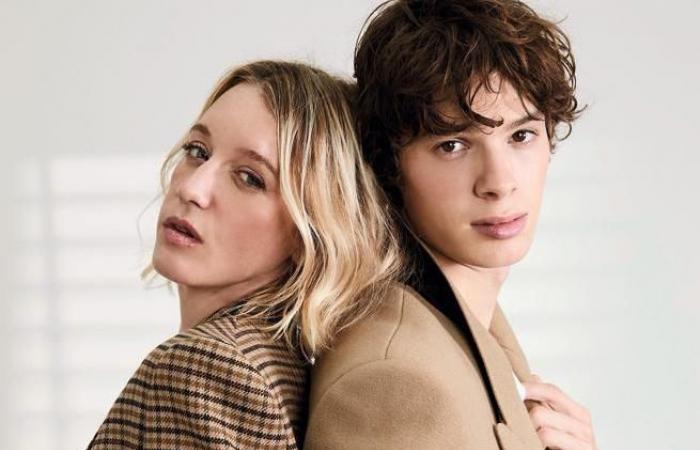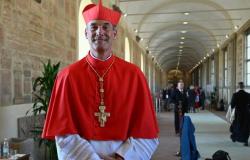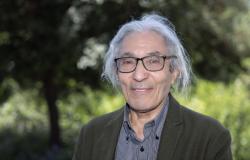CROSS INTERVIEW – They play a mother and son in Their Children after themthe adaptation of the Prix Goncourt by Nicolas Mathieu. Between this demanding actress and this rising prodigy, the complicity is obvious.
Between the two of them, there is a narrative obviousness, the impression of having already seen them together in the cinema. Yet no, even if they had filmmakers or partners in common, like Christophe Honoré or Romain Duris; fictional bridges, like a cinema genealogy. These days, Ludivine and Paul finally, and truly, cross paths in Their children after themadaptation of the novel by Nicolas Mathieu, 2018 Goncourt Prize and publishing success with more than 700,000 copies sold. An ambitious generational fresco carried by a furious soundtrack (Metallica, Red Hot Chili Peppers, but also Johnny Hallyday and Francis Cabrel), the film is by twin brothers barely thirty years old, Ludovic and Zoran Boukherma.
Carnal evocation of France in the 1990s, Their children after them follow, over four summers, the thwarted love of two teenagers, Anthony (Paul Kircher) and Stéphanie (Angelina Woreth). With the backdrop of the East and its abandoned blast furnaces. As a harsh but generous mother, Ludivine Sagnier is impeccable. From international series (Lupin, Franklin) in cutting-edge films (Kore-eda, Honoré or Ozon, her cinema “father”), the one who started her career at the age of 9 impresses each time, an actress in constant reinvention whose spectrum continues to broaden.
”
data-script=”https://static.lefigaro.fr/widget-video/short-ttl/video/index.js”
>
She is also a committed citizen, who prefers discreet but constant action to thunderous speeches: when she leaves the sets, Ludivine Sagnier does not stop working in cinema, since she passes on her knowledge to aspiring actors and filmmakers at within the Kourtrajmé film school, which she set up with directors Ladj Ly (Les Miserables) and Kim Chapiron (the father of her last two daughters).
For his part, Paul Kircher, a candid young wolf, literally eats up the screen in Their children after them. Son of actors Irène Jacob (seen with Krzysztof Kieślowski in particular) and Jérôme Kircher, he is, at 22 years old, the incandescent talent that French cinema labeled “auteur” is fighting for. Sulking pout, black eyes, disheveled hair, he gives substance, through his films, to adolescent suffering in all its darkness and purity. In 2022 (with The High School Student), then in 2023 (with The Animal Kingdom), he is nominated for the César for male revelation.
And for Their children after themhe received the Marcello-Mastroianni prize at the last Venice Festival – a great omen. This October day in Paris, Paul Kircher is no longer the rebellious and on edge teenager we know on screen. He is a calm, talkative and cheerful young man, having fun with Ludivine Sagnier's mischievous dog on his lap. Not yet completely accustomed to the exercise of the interview, Paul Kircher takes the time to find the right words before responding, seeking Ludivine's approval. Benevolent, maternal, she watches him with her eyes. Between suppressed laughter and exchanges, the complicity of the two is obvious. Cross-interview.
Madame Figaro. – Adapt a book that has touched the public so much, how do you go about it?
Ludivine Sagnier. – There is always the possible pitfall of disappointing people who have made the story their own… I too had read and loved Nicolas Mathieu's novel when it came out, well before the adaptation project. This is a book that I have recommended to many friends. So when Ludovic and Zoran Boukherma asked me to participate in their film, it was a chance to bring these characters to life. Their adaptation is quite faithful, even if there are a few ellipses. Nicolas Mathieu did not expect his novel to be adapted to the letter – here, it is really the energy that prevails. During the filming, I used the book, which was like a bible for me and helped me build the character of the mother, Hélène. Everything that was not said in the script, I found in the novel, a bit like the stage directions.
Paul Kircher. – Every day, during the three weeks of filming, I saw Ludivine arrive with her book… She often reread a few pages before shooting a scene. I discovered the novel at the same time as I read the script, and I found my character, Anthony, without even thinking about the book…
Luc Braquet
In the film, the 1990s are a real character… What does this decade mean to you?
L. S. – I loved the 1990s, they were my adolescence – a very happy adolescence. In retrospect, this era seems particularly light to me… When we compare with the years 2000, 2010 or 2020, we realize that we were quite lucky to have been teenagers at that time. The 1990s are a lot of new sensations for me. Obviously, especially the music! At the time I discovered techno, I listened to a lot of Radio FG, and then, of course, it was the advent of hip-hop… I have the impression that as teenagers, the music overwhelmed us. Finally owning a CD album that you had saved for weeks for really meant something! Maybe that's less the case today, there are a lot more productions, more broadcasts, and everything is a little diluted with streaming… But I'm not nostalgic. On set, we really felt like we were in a period film, with so much attention paid to the details of popular culture, clothing, hobbies, settings, etc. For example, in the film, my character drives a light blue Opel Kadett, exactly the one my parents owned! Finding myself behind the wheel of this car immediately took me back to my adolescence. I was there, in my mother's place.
P. K. – The 1990s, I didn't know them, obviously, so I can't say if we're embellishing this period… I'm not someone nostalgic either, I like being there now. For me, the decade of nineties above all evokes a colorful, warm period. And then, the music: Nirvana, the Pixies… The music is really the cry of this lost valley in the East told in the film. The soundtrack of these people who loved each other and left each other.
One of the subjects of the film is this deindustrialized, peripheral France, which has been forgotten. does this speak to you?
L. S. – Both the book and the film talk about social determinism. The character of Stéphanie particularly touches me. This girl, who will tear herself away from her working class environment, leave her region, go to Sciences Po in Paris, will come up against the violence of what it means to be a “class defector”… Being a defector is in no way a guaranteed happiness. Arriving in the capital, she realizes that she is not from this environment, that she does not have the codes. This illustrates the relativity of classes: we are always someone's redneck. Social determinism is my battle in life. And this is what I have been working on for several years at the Kourtrajmé film school, located in Montfermeil, in the Paris suburbs. A school open to all, free, with no qualification requirements. I head the Production and Design section there, I support the students, it's very hands-on. This work is bearing fruit, we see the actors and actresses we have trained working more and more. I have the satisfaction of working, on my own scale, to enrich our society.
Luc Braquet
Paul, you started as an actor after choosing music. what was the trigger?
P. K. – Acting has always been important to me, but it has never been a project. When I was younger, I enjoyed being on stage, giving small concerts, that was all there was to it. My parents obviously showed me lots of films, but I haven't kept many memories of them, apart from perhaps Charlie Chaplin or Louis de Funès who I adored as a child. It was only around the age of 18, when I started my geography studies, that I started watching lots of films on my own, building up a mental cinema library. I loved movies like The night belongs to us, by James Gray, with Joaquin Phoenix, or At the end of the race, by Sidney Lumet, with River Phoenix. Another great film about adolescence, which Christophe Honoré recommended me to see, is To our lovesfrom Pialat.
Paul, in your films, you often play a teenager in transition, or undergoing a physical transformation… what attracts you to this type of character? ?
P. K. – Adolescence is a quest for identity, an ongoing construction. We don't really know what we want, we have dreams in our heads, like my character who wants to go to Texas… With Their children after themI immediately saw an opportunity to work once again on the body, the physical evolution of a character. It was great to explore what it's like to be 14 in this superb story, both tragic and funny. At the time of Animal kingdomI had worked with a choreographer who taught me to develop a body vocabulary, to change the way I move when my character begins its transition towards its “becoming animal”… For my next film, which I am going to shoot with Hubert Charuel (the director of Petit Paysan, Editor’s note), I play an older character, I'm finally leaving adolescence…
L. S. – We tend to be wrong about Paul, to believe that he became an actor thanks to his personality, his charisma, his nature. It's very limiting, I find, because he's an actor who works a lot. He is very attached to details, he works in a very subtle and conscientious way. His physical transformation in the film is stunning. I think his compositional work for The Animal Kingdom enlightened him to become Anthony. At the beginning of the film, he really looks like a big teenager, stiff, with a clumsy gait… He did it so well during filming that I often told him: “Stop walking like that!” It irritated me, a bit like a mother with her son. And then, his character is more and more anchored in the ground, he develops a form of solidity, it's quite extraordinary.
We're always someone's redneck
Ludivine Sagnier
Paul, Ludivine was your godmother for the 2024 Césars. Does she give good advice?
P. K. – I feel very lucky to have worked with her, we were close straight away, we are very close. I love observing her in her game, and in her way of being herself. I asked her a lot of questions about her early career – she started as a child. When she tells me about her failures or her doubts at the time, I recognize myself. And I tell myself that even going through the troubles I'm going through, we can get through it!
L. S. – Sometimes I warn him, I try to make my experience useful to him. I don't know why, I want him to be happy. And then, I recognize myself in his parents, whom I love very much and whom I have known for a long time, even before his birth. The family climate and the values that were transmitted to him, everything speaks to me. Paul could be my son… That’s good, I don’t have any, I only have daughters!
Their children after them, by Ludovic and Zoran Boukherma, with Ludivine Sagnier, Paul Kircher, Sayyid El Alami, Angelina Woreth, Gilles Lellouche… Released December 4.






